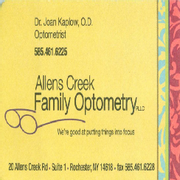
A child's vision can play a prominent role in their overall health and happiness. Quality vision care should be a priority. During the developmental stages, their eyes will change significantly within a short period of time. While schools offer vision tests, they are not comprehensive enough to detect acuity issues. If a child is having clarity issues, it can negatively impact their grades, reading fluency and athletic achievements. The changes can frustrate them, but with a proper exam and an effective glasses prescription, your child can see life the way they were meant to.
How Can You Tell If Your Child Needs Glasses?
1. Excessive Squinting
Near and farsighted children often squint to better see objects that are far away or close, respectively. They may do this often since squinting changes the shape of the eyes, compressing the size of the blurry image to compensate for the lack of clarity. It also reduces the amount of light entering their eyes, making it easier for them to focus on the object in view. However, squinting only temporarily improves vision and can frustrate your child the more they need to rely on it. While everyone squints from time to time, it's often a sign of a larger issue that should be investigated with an eye exam.
2. Reading Difficulties

Visual issues can make learning to read more difficult. Children may lose their place or skip lines often. To compensate, many children will point to each word as they read along. It helps them stay organized and differentiate between words that may appear crowded by blurred vision. With glasses, children will have an easier time identifying words and will have fewer problems keeping up with their reading.
3. Sitting Position
A child may need to sit toward the front or the back of the classroom, which is often a sign they need glasses. As a quick test, look at the way they sit when watching TV at home. If they're significantly closer or further away, schedule an appointment with an optometrist, who can test their acuity.
4. Frequent Headaches
Farsighted and nearsighted children work harder to bring objects into view, which can cause consistent brow and frontal headaches. In some cases, they may even begin to feel nauseous when overexerting themselves. Some children will age out of farsightedness as their eyes lengthen, but it's impossible to predict who will outgrow these conditions. Given how common the issues are, a simple glasses prescription can correct their vision and resolve their headaches.
Your child's vision affects every aspect of their life. Taking them for annual eye exams will help ensure they're happy and healthy. Since 2007, the optometrists at Allens Creek Family Optometry have helped children across Rochester, NY, see with greater clarity through detailed exams and vision therapy. They also have a variety of frame options that along with quality lenses, can improve vision AND complement their style. For more information on their eye care services, visit their website. To schedule an appointment, call them at (585) 461-6225.
About the Business
Have a question? Ask the experts!
Send your question

